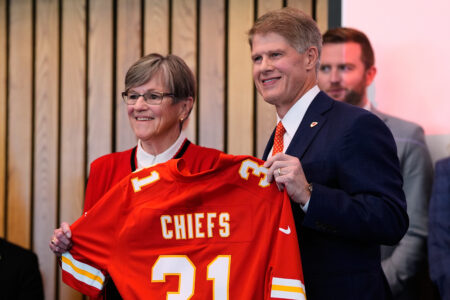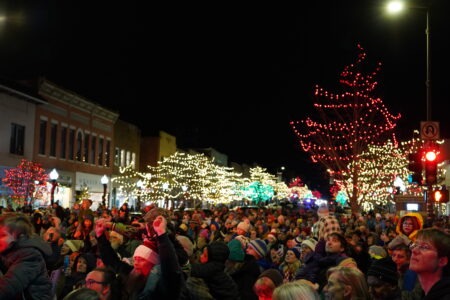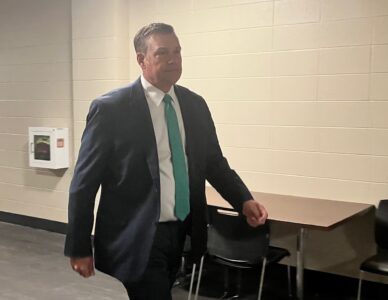Baldwin City farm hopes to help pull off a big comeback — the return of live horse racing to Kansas
A thousand new gambling machines may produce millions to fund horse racing in the state

photo by: Chad Lawhorn/Journal-World
A race horse grazes on pasture at Madl Farms in rural Baldwin City on Feb. 3, 2025.
From his Baldwin City ranch that dates back to his grandfather, Ted Madl remembers how Kansas horse racing was decades ago.
It was never champagne, fancy hats and other accoutrements that you might find in Kentucky or California. More often it was thinly paved highways to small locales with a truck, a horse trailer and an ugly mare.
Places like Eureka and Emporia were the prestigious destinations. The less prestigious spots, Madl couldn’t rightly tell you the location of those. Usually, they were along the edge of a pasture in the middle of the countryside.
That’s where Kansas match racing burned the hottest in the 1950s and ’60s. Quarter horses — not the kingly Thoroughbreds that run for the Triple Crown — lumbered off of those horse trailers. Two of them would line up side-by-side and sprint in a straight line to see who could break a string at the other end of the pasture. Think of it like drag racing with hooves.
Madl was just a boy for many of those races, and was in tow with his father. But he stood in the pasture with everyone else, and picked up on the lessons that the astute learned.
“You had to watch who the hell you were dealing with,” Madl recalls of the crowd that included horsemen who gambled and gamblers who just gambled.

photo by: Chad Lawhorn/Journal-World
All Go One Go is pictured on Feb. 3, 2025 at Madl Farms in rural Baldwin City.
The races were serious enough that the Madls had a trainer who worked for them. You weren’t going to do too well just pulling a horse out of the barn, after all. For the life of him, Madl can’t remember the trainer’s name, but he can still picture his favorite horse.
“He loved that mare,” Madl said of the trainer. “He made a lot of money on her. She was ugly, and everybody would bet against her.”
If you are a bookworm, you learn to never judge a book by its cover. If you are a horseman, you learn it is OK to bet on an ugly mare.
Back in those days, placing the bet was … adventurous. There was no such legality — in Kansas, anyway — known as parimutuel wagering. No ticket booth with a kindly teller.
“Back then it was all pocket cash,” Madl said.
By the mid-1980s, Kansas had added parimutuel wagering to its books, and Kansas horse racing became more than pocket cash. It reached its height in 1989 with the opening of The Woodlands racetrack in Kansas City, Kan. It and places like historic Eureka Downs — which was holding races at the turn of the 20th century — were home to Thoroughbred racing, with owners who maybe didn’t quite have the speed of a Derby champion but had the dreams of one.
Then, there came a day when Kansas horse racing had its reins pulled hard. The sport went backward and completed its long transition from pocket cash to pocket lint.
The tracks withered away as slot machines and casinos became legal in Missouri and Kansas in the 1990s. The bettors who were keeping the tracks in business were gamblers who gambled rather than horsemen who gambled, and they turned to slot machines and the efficiency of levers, spinning wheels and dumb luck.
But now, Kansas’ horse racing industry may have its hooves underneath it again. If so, it will be because of a device that looks a lot like a slot machine. They are called Historical Horse Racing machines, and 1,000 of them are going to be installed just outside of Wichita. More importantly, approximately three cents of every dollar that goes into those machines is set to be earmarked to support live Kansas horse racing.
It is a system multiple states have used to revive horse racing, and a longtime horse racing executive thinks it is a reasonable bet that the strategy can work in Kansas too.
“I think Kansas has an opportunity to again become a significant racing state,” veteran horse track operator Jeff True said.

photo by: Chad Lawhorn/Journal-World
Sha Harmon, Mackenzie Reynolds, Peach Madl and Ted Madl are pictured at Madl Farms on Feb. 3, 2025 in rural Baldwin City.
•••
It is nearly a surefire bet that Historical Horse Racing machines are coming to Kansas.
Construction is already underway to convert a former greyhound race track just outside of Wichita — in Park City — to a new type of gambling facility. And the project — Golden Circle Casino — does not lack for an adequate financial backer. The project is led by billionaire Phil Ruffin, owner of major Las Vegas casinos and possessor of many connections. Exhibit 1: He sat closer to his good friend, President Donald Trump, at the inauguration last month than Elon Musk did.
Golden Circle, though, won’t be a traditional casino. It won’t have blackjack, roulette or any other type of usual gambling game. Instead, its only gambling device will be the 1,000 Historical Horse Racing machines.
What the heck are those?
“If you have been to a casino, you know what an HHR machine looks like,” said True, who is now the senior vice president of sales for 1/st Technology, a firm that sells HHR machines.
They look like slot machines, and if you so choose, you can play them much the same way by pushing a button every few seconds and waiting for a machine to deliver your fate. But there are legal and fundamental differences between slots and HHR machines.
The biggest is a random number generator isn’t controlling an HHR machine. Instead, actual horse races that were run at some point in history determine the outcomes of HHR bets. Bettors are presented with a list of horses and some data about those horses — past results, speed figures, and other such information that horse handicappers use at real race tracks. What bettors aren’t presented with is the actual name of the horses or the date on which the race was won. So, trying to cheat the system by Googling the results won’t be fruitful.
Bettors can handicap the races themselves, pick the order of horses, push a button and then watch a quick video clip showing the end of the actual race they bet on. The machine will tell them whether they won or lost.
The house makes its money by keeping a percentage of every dollar bet, but importantly, state law requires that it also send 3% to a fund that will be used to help build up the live horse racing industry in Kansas.
How much might that be? True said his educated estimate is that 1,000 machines — the maximum state law currently allows — would produce $1 billion per year in bets. That would mean about $30 million a year to support live horse racing in the state.
“It is coming fast and furious,” D.J. Lopez, director of gambling for the Kansas Racing and Gaming Commission, said of potential change in the state’s horse racing industry.

photo by: Submitted photo
The track at Eureka Downs is pictured.
•••
Exactly when it will come isn’t yet known. The Golden Circle — complete with its 21,000-square-foot Gilley’s Saloon and Dance Hall — is expected to open before the end of the year. Theoretically, that’s when the money will start flowing to a variety of funds to support live horse racing.
About two thirds of the funds will flow to the historic Eureka Downs — located about an hour east of Wichita — to get that racetrack ready to hold a meet for the first time in more than 15 years.
The track already has received $1 million from the state for repairs, and is scheduled to receive another $1 million payment in the coming months. The hope is that racing will begin in the summer or fall of 2026, but much depends on the Golden Circle being, well, golden and producing the expected revenue.
“We are kind of in a waiting game,” said Stacy Randle, secretary of the Greenwood County Fair Board, which has been the track’s faithful caretaker for all these years.

photo by: Submitted
A grandstand view at Eureka Downs is pictured.
Randle said consultants are completing their work on what improvements need to be made to make racing safe and feasible at the track. The board is waiting on those results before it starts recruiting a private operator for the track.
What’s not waiting is the excitement.
“It would help Eureka’s economy so much,” Randle said of the town of about 2,300 people. “When racing ended, we lost all of those families. Trainers left, horseshoers left. We had jockeys who lived in town, and they left.”
Chances are, however, not everyone in the state is going to love what is to come. For one, gambling isn’t universally loved. For another, the horse racing industry has been the subject of multiple questions about whether it is doing enough to care for the health of its horses, as some of the biggest names in the sport have been punished for illegal doping.
Lopez is hoping that the state’s regulatory system will help assuage some of those concerns. The Kansas Racing and Gaming Commission will be the regulator for the sport. Lopez told the Journal-World that the commission will hire veterinarians, stewards and other professionals who will be tasked with ensuring the safety of both the horses and the jockeys.
There also may be something about Kansas racing that may be comforting in ways that the major stakes racing in Kentucky, New York, California and elsewhere is not. Kansas racing will be on a different scale, said True, who has served as the general manager of prominent tracks including Los Alamitos in California and Ruidoso Downs in New Mexico.
You’ll be more likely to see a group of Midwest farmers own a race horse than a Mideast sheik. And in the intimate setting of Eureka Downs, you most likely really will see them. The track is small by any standard, but it also is very family friendly, Randle said. That involves opportunities to see the horses up close and how much their hands-on owners care for them.
“The majority of horse owners I know spend more money on their horses than anything else they have,” Randle said.
But Randle said there is one other reason Kansans should root for horse racing — a love of small towns. Not many race horses are raised in a big city. The raising and breeding of horses — if the industry indeed returns — will happen throughout the state. About one-third of the expected HHR proceeds will be dedicated to horse breeding incentives. That’s economic development money that will be going to rural communities rather than a big city factory or another retail project in a county that has many of them.
Randle thinks that is a change of pace many Kansas residents will appreciate.
“A lot of times it is geared to, I hate to say it, larger cities,” Randle said of efforts to spur the economy. “How can we help them? Then you find out what happens to rural communities. When the horse races ended, we lost so many families.”

photo by: Chad Lawhorn/Journal-World
The stallion All Go One Go is pictured on Feb. 2, 2025 at Madl Farms in rural Baldwin City.
•••
Ted Madl’s ranch southeast of Baldwin City is more likely to have a white, round corral than a Golden Circle. But the 200 or so acres of rolling Kansas pasture may be just as important to bringing live horse racing back to the state as the Wichita-area casino project.
Phil Ruffin will provide new gambling machines and the money that comes with them. The Madls intend to provide actual horses.
However, if you have bet on Ted Madl being the fellow who is going to bring live horse racing back to Kansas, you might not cash that ticket. Sure, Ted is a supporter, but it is his wife, Peach Madl, who is the passion.

photo by: Chad Lawhorn/Journal-World
Peach Madl is pictured in the stable area of Madl Farms on Feb. 3, 2025.
Peach — best known in Lawrence as the founder and guiding spirit of the popular downtown bar The Sandbar — teamed up with longtime friend Sha Harmon several years ago on an idea. Why not buy a race horse?
Ted, after all, was an expert horseman. After his days of Quarter Horse racing, he went on to become a 17-time world champion in halter horse, which is an event that shows off various breeds of horses.
In other words, he definitely had a horse trailer.
“We took a trailer to Heritage Place in Oklahoma City for a horse auction,” Peach says as Ted mutters an expletive upon the start of the story. “It was a two-hole trailer, and Ted said just use one hole. That was the first time we went to an auction where you could drink.”
The duo came back with twice as many horses as they had planned.

photo by: Chad Lawhorn/Journal-World
Sha Harmon and Peach Madl carry a jockey figurine on Feb. 3, 2025 at Madl Farms in rural Baldwin City.
Now, after about seven years of being in the business, a visitor to Madl’s ranch is likely to get a ride on a Gator utility vehicle to drive through the pastures to see the half-dozen Thoroughbreds currently on the farm.
There’s Alaskan Bird, a broodmare who has championship bloodlines. Her father — a sire in horse talk — is Birdstone, who won the prestigious Belmont Stakes in 2004, and then went on to father Mine that Bird, who won the Kentucky Derby in 2009. Mo Gayle is another with a championship father, Uncle Mo, who won the 2010 Breeders Cup.
In addition to the horses at the Baldwin farm, there are two more at farms in other states. That particularly burns Peach.
“It is crazy because we have nothing but these pastures,” Peach said.
But there’s a common reason a Kansas race horse owner will have a horse stabled in another state: The mare is about to give birth.
For years, there’s been no good reason to allow a race horse to birth a horse in Kansas. That’s because a major source of income for race horse owners is not just the earnings they get when they win a race, but also the payout they get from state breeding associations. For example, if you win a race in Kentucky, you get a check from the racetrack. But if the horse also was born in Kentucky, you will get a check from the state’s breeding association too. The same holds true for states like Oklahoma, Iowa, Arkansas and basically any other state that has live horse racing. The breeding payments are an incentive for breeding operations to locate in a state, which states are betting will produce positive economic impact and help keep horse racing viable in their states.
Kansas saw some of those results when horse racing and the breeding program were active in the state. A 1996 state report found there were more than 6,400 race horses in the state with a 1996 value of nearly $14 million. It also found there were more than 380 trainers employed in the state and more than 200 groomers and exercise riders.
But with no live horse racing in Kansas, there’s been no money to fund a breeding program. That is still very much the case today, but the Madls and a handful of others are betting that will change.
The Madl ranch is now stabling a Thoroughbred stallion owned by another racing family. For a $1,000 fee, the stallion — All Go One Go, a more than $700,000 stakes winner — will mate with a mare to produce what hopefully will be the next great race-winning horse.
The Madls believe there are only three farms in the state currently standing a Thoroughbred stallion, but they can envision the day when there are many more. When that day comes, the world will make a little more sense to Kansas horse lovers.
“It is not fair that we haven’t been able to raise here,” Peach said. “We’re cowboys.”
Justine Staten, executive director of the Kansas Horse Council, said the Madls have been doing more than most to change that reality. Staten said the Madls and one longtime Quarter Horse owner in the state have been paying the bulk of the lobbying bills and other expenses needed to get legislation in place to support live horse racing.
That work is continuing in this current legislative session. While there’s approved legislation that creates a funding mechanism, that proviso in the law runs through 2026. Legislative work is underway now to get that funding structure in place more permanently, which would give horse operators more confidence in making investments in the state.
There’s optimism that legislators have the will to do that, given that they already have approved the HHR machines and given money to the Eureka Downs project. Peach — recalling her bartending background — already has volunteered to plan the celebration when the legislation becomes law.
“Oh, we are going to have a party,” she said.
Then, she’s hoping for years of doing what she dearly loves — watching fast horses.
“They fly,” Peach says. “They are so graceful.”
Ted — a Quarter Horse man who likes to poke a Thoroughbred owner like a Ford fan does to a Chevy owner — quickly chimes in.
“You ain’t never had one fly fast enough, dear,” Ted says.
Without missing a beat, Peach has an answer, drawing from a list of horse names that now rival the cocktail lists from her bartender days. Posso Volare, she says of a horse she has. It is Italian for “I Can Fly.”
“She’s going to fly,” Peach says.
And that is the state of Kansas horse racing today: It’s reasonable — and fun — to dream again.

photo by: Chad Lawhorn/Journal-World
Ted Madl works with the stallion All Go One Go at Madl Farms in rural Baldwin City on Feb. 3, 2025.







